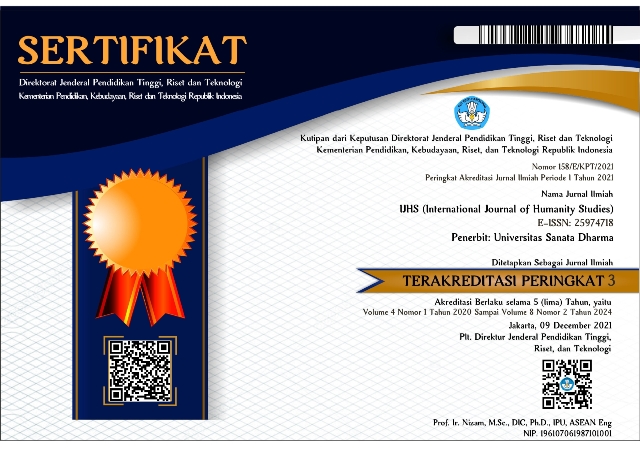NICKI MINAJS COMMENTS IN AMERICAN IDOL SEASON 12: AN ANALYSIS OF WOMENS LANGUAGE FEATURES
(1) Sanata Dharma University
(2) Sanata Dharma University
(*) Corresponding Author
Abstract
Full Text:
PDFReferences
Cheshire, J. (1984). The relationship between language and sex in English. In Trudgill, P. (Ed.), Applied Sociolinguistics. London: Academic Press.
Edwards, J. (1985). Language, society and identity. Oxford: Basil Blackwell.
Engle, M. (1979). Do fathers speak motherese? An analysis of the language development of young children. In Giles, H., & St. Clair, R. N. (Eds.), Recent advances in language, communication, and social psychology. London: Lawrence Erlbaum Associates Ltd.
Gleason, J. B., & Perlmann, R. Y. (1985). Acquring social variation in speech. In Giles, H., & St. Clair, R. N. (Eds.), Recent advances in language, communication, and social psychology. London: Lawrence Erlbaum Associates Ltd.
Good, D. (2012). Nicki Minaj biography: More than a rap artist [Electronic version]. New York, NY: Barnes & Noble, Inc.
Holloway, L. (2012). Nicki Minaj: The woman who stole the world [Electronic version]. Pheonix: Amber Communications Group, Inc.
Holmes, J. (2008). An introduction to sociolinguistics (3rd ed.). Essex: Pearson Education Limited.
Kress, G. & Hodge, R. (1979). Language as ideology. In Trudgill, P. (Ed.), Applied sociolinguistics. London: Academic Press.
Lakoff, R. (2004). Language and womans place: Text and commentaries (M. Bucholtz, Ed.). New York, NY: Oxford University Press, Inc.
Wardaugh, R. (2006). An introduction to Sociolinguistics (5th ed.). Oxford: Blackwell Publishing Ltd.
DOI: https://doi.org/10.24071/ijhs.v1i2.684
Refbacks
- There are currently no refbacks.
Copyright (c) 2018 Diana Chandra, Made Frida Yulia
Indexed and abstracted in:
IJHS Sinta 3 Certificate (S3 = Level 3)
International Journal of Humanity Studies (IJHS) has been nationally accredited Sinta 3 by the Ministry of Education, Culture, Research and Technology of the Republic of Indonesia based on the decree No. Surat Keputusan 158/E/KPT/2021. Validity for 5 years: Vol 4 No 1, 2020 till Vol 8 No 2, 2024

This work is licensed under CC BY-SA.
Creative Commons Attribution-ShareAlike 4.0 International License.
p-ISSN: 2597-470X (since 31 August 2017); e-ISSN: 2597-4718 (since 31 August 2017)
Notice: The opinions expressed in this publication are those of the authors. They do not purport to reflect the opinions or views of the editorial team or publishers.
International Journal of Humanity Studies (IJHS) is a scientific journal in English published twice a year, namely in September and March, by Sanata Dharma University, Yogyakarta, Indonesia.


















